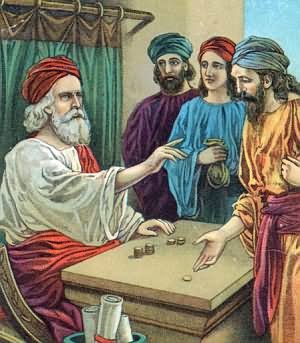Let’s look at the parable of the mustard seed from Matt 13:31-32
A little background to the Mustard seed will throw a new light to this parable. The mustard plant of Palestine was very different from the mustard plant which we know today. To be strictly accurate the mustard seed is not the smallest of seeds; the seed of the cypress tree, for instance, is still smaller; but in the east it was proverbial for smallness. For example, the Jews talked of a drop of blood as small as a mustard seed; or, if they were talking of some tiny breach of the ceremonial law, they would speak of a defilement as small as a mustard seed; and Jesus himself used the phrase in this way when he spoke of faith as small as a grain of mustard seed (Matt.17:20).
In Palestine this little grain of mustard seed did grow into something very big like a tree. The mustard plant can grow as tall as the horse and his rider. When uprooted it could found to be more than twelve feet high, therefore in this parable there is no exaggeration at all.
Further, it was a common sight to see such mustard bushes or trees surrounded with a cloud of birds, for the birds love the little black seeds of the tree, and settle on the tree to eat them.
Jesus said that his Kingdom was like the mustard seed and its growth into a tree. The point in question is crystal clear. The Kingdom of Heaven starts from the smallest beginnings, but no man knows where it will end. In eastern language and in the Old Testament itself one of the commonest pictures of a great empire is the picture of a great tree, with the subject nations depicted as birds finding rest and shelter within its branches. The book of Eze.31:6 gives a clear depiction of this. This parable tells us that the Kingdom of Heaven begins very small but that in the end many nations will be gathered within it.
It is the fact of history that the greatest things must always begin with the smallest beginnings.
(i) An idea which may well change civilization begins with one man. In the British Empire it was William Wilberforce who was responsible for the freeing of the slaves. William Wilberforce (24 August 1759 – 29 July 1833) was a British politician, philanthropist and a leader of the movement to abolish the slave trade. In 1785, he underwent a conversion experience and became an evangelical Christian, which resulted in major changes to his lifestyle and a lifelong concern for reform. In 1787, Wilberforce came into contact with Thomas Clarkson and a group of activists against the slave trade, including Granville Sharp, Hannah More and Charles Middleton. They persuaded Wilberforce to take on the cause of abolition, and he became a leading English abolitionist. He headed the parliamentary campaign against the British slave trade for 20 years until the passage of the Slave Trade Act of 1807.
In later years, Wilberforce supported the campaign for the complete abolition of slavery and continued his involvement after 1826, when he resigned from Parliament because of his failing health. That campaign led to the Slavery Abolition Act 1833, which abolished slavery in most of the British Empire. Wilberforce died just three days after hearing that the passage of the Act through Parliament was assured.
An idea was sown in the mind of one man, and that idea changed life for hundreds of thousands of people. An idea must find a man willing to be possessed by it; but when it finds such a man an unstoppable tide begins to flow.
The question to ask myself is “Am I willing to be that one person responding to the idea put there by the Lord”?
(ii) A witness must begin with one man. Cecil Northcott tells in one of his books that a group of young people from many nations were discussing how the Christian gospel might be spread. They talked of propaganda, of literature, of all the ways of disseminating the gospel in the twentieth century. Then the girl from Africa spoke. “When we want to take Christianity to one of our villages,” she said, “we don’t send them books. We take a Christian family and send them to live in the village and they make the village Christian by living there.” In a group or society, or school or factory, or shop or office, again and again it is the witness of one individual which brings in Christianity. The one man or woman set on fire for Christ is the person who kindles others.
Do I witness to the Lord Jesus Christ or do I wait for others to begin and then join in? I would encourage each one of you to seek the grace of the Lord in prayer to begin witnessing, if not already begun.
(iii) A reformation begins with one person. One of the great stories of the Christian Church is the story of Telemachus. He was a hermit of the desert, but something told him–the call of God–that he must go to Rome. He went. Rome was nominally Christian, but even in Christian Rome the gladiatorial games went on, in which men fought with each other, and crowds roared with the lust for blood. Telemachus found his way to the games. Eighty thousand people were there to spectate. He was horrified. Were these men slaughtering each other were they also not slaughtering children of God? He leaped from his seat, right into the arena, and stood between the gladiators. He was tossed aside. He came back. The crowd were angry; they began to stone him. Still he struggled back between the gladiators. The prefect’s command rang out; a sword flashed in the sunlight, and Telemachus was dead. Suddenly there was a hush; suddenly the crowd realized what had happened; a holy man lay dead. Something happened that day to Rome, for there were never again any gladiatorial games. By his death one man had let loose something that cleansed an empire. Is the Lord calling me to begin a reform, I do not know where it may end. The only condition I need to be is an instrument or a vessel in the hands of the Lord is the answer “Yes, Lord use me”.
(iv) This was one of the most personal parables Jesus ever spoke. Putting myself in the shoes of the disciples and their despair. Their little band was so small and the world was so wide. Could they ever win the world and change it. Yet with Jesus an invincible force who entered the world. In the words of H.G. Wells “I’m a historian, I’m not a believer, but I must confess as a historian that this penniless preacher from Nazareth is irrevocably the center of history. Jesus Chris is the most dominant figure in all history”. What is Jesus saying in this parable to you and to me. He states that there is no place for discouragement, each one must serve and witness where he or she has been placed. Each one of us will have small beginning but we need to allow the kingdom to grow. Just by responding to this call, who knows where the Kingdom of God may spread and flourish.
I conclude with a stanza from the Lift Up Your Heads, Ye Gates of Brass by James Montgomery
Though few and small and weak your bands,
strong in your Captain’s strength
go to the conquest of all lands;
all must be His at length.



